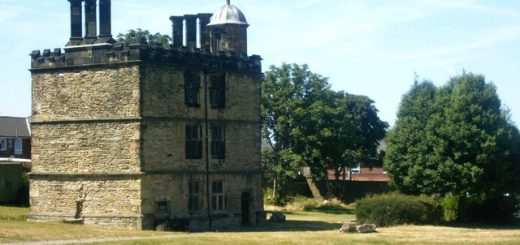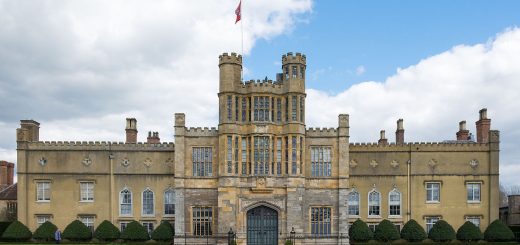Rev. Shaw’s Experience, Souldern Rectory (1706)
In 1706 the rectory at Souldern was the site of a reported apparitional experience, in which the witness apparently conversed with the ghost and received a warning that his own death was soon approaching.
The old rectory is now gone, demolished around 1890 when a replacement was built. ‘A History of the County of Oxford: Volume 6’ (1959) tells us that the rectory ‘stood north of the church and was built before 1638 by the rector Thomas Harding. It was repaired in 1809 by Robert Jones, whom Wordsworth described as ‘one of my earliest and dearest friends’. Wordsworth stayed in the house, probably in 1820, and afterwards wrote the sonnet called ‘A Parsonage in Oxfordshire’. Later, in another sonnet, he described ‘this humble and beautiful parsonage’, and the church and churchyard. The rectory had wellstocked fishponds in 1723 at least, when the rector noted that 31 brace of carp had been taken out of one.’
 The following description of the experience was published in ‘The Haunted Homes and Family Traditions’ of Great Britain by John Ingram (1897. ‘In the register of Brisly Church, Norfolk, against the 12th of December 1706, stands the following words, which may serve as introduction to the extraordinary story we have to tell in connection with Souldern Rectory:
The following description of the experience was published in ‘The Haunted Homes and Family Traditions’ of Great Britain by John Ingram (1897. ‘In the register of Brisly Church, Norfolk, against the 12th of December 1706, stands the following words, which may serve as introduction to the extraordinary story we have to tell in connection with Souldern Rectory:
“I, Robert Withers, M.A., vicar of Gately, do insert here a story which I had from undoubted hands; for I have all the moral certainty of the truth of it possible.”
The narrative referred to by Mr. Withers is as given in the following sentences, but not in the precise words of that gentleman, as they only furnish a very abridged account of the mysterious affair, besides deviating slightly from the more circumstantial and exact particulars given in the private correspondence, subsequently published in the Gentleman’s Magazine, which passed between the Rev. John Hughes, of Jesus College, Cambridge (the learned editor of St. Chrysostom on the Priesthood) and the Rev. Mr. Bonwicke, very shortly after the events referred to took place. Mr. Hughes, who derived his information from Mr. Grove, public registrar of the Cambridge University, and the intimate friend of Mr. Shaw, writes thus:
“The Rev. Mr. Shaw, formerly fellow of St. John’s College, Cambridge, and subsequently rector of Souldern, a college living within twelve miles of Oxford, on the night of the 21st of July 1706, was sitting by himself smoking a pipe and reading, when he observed somebody open the door, and turning round was astounded to see the appearance of Mr. Naylor, formerly his fellow collegian at St. John’s, and his intimate friend, but who had been dead fully five years. The apparition came into the room, garbed apparently in exactly the same clothes, and in exactly the same manner, as Mr. Naylor had been accustomed to at the University. Mr. Shaw was, of course, intensely amazed, but asserted that he “was not much affrighted,” and, after a little while recollecting himself, desired his visitor to sit down; this the apparition of Mr. Naylor did, drawing the chair up to his old friend and sitting by him. They then had a conference of upwards of an hour and a half, during which the visitor informed Mr. Shaw that he had been sent to give his old friend warning of his death, which would be very soon and very sudden. The apparition also mentioned several others of St. John’s, particularly the famous Orchard, whose deaths were at hand. Mr. Shaw asked him if he could not give him another visit; but he said “No,” as his (the apparition’s) alloted time was but three days, and that he had others to visit who were at great distances apart. Mr. Shaw had an intense desire to inquire about the apparition’s present condition, but was afraid to mention it, not knowing how it would be taken. At last he expressed himself in this manner:
“Mr. Naylor, how is it with you in the other world?”
He, the apparition, answered with a brisk and cheerful countenance, “Very well.”
Mr. Shaw proceeded to ask, “Are there any of our old friends with you?”
“Not one,” responded he; “but Orchard will be with me soon, and you not long after.”
After this discourse the apparition took its leave and went out. Mr. Shaw offered to accompany it out of the room, but it beckoned with its hand that he should stay where he was, and seeming to turn into the next room, disappeared.
The next day Mr. Shaw made his will, and not very long after, being seized with an apoplectic fit while he was reading service in church, he fell out of the desk, and died almost immediately.
“He was ever looked upon as a pious man and a good scholar,” says Mr. Hughes, who had the story of the apparition from Mr. Grove, a particular friend of Mr. Shaw, and who, being on a visit to Souldern soon after the event, had the whole particulars from the minister’s own lips. Mr. Grove returned to Cambridge soon afterwards, and meeting with one of his college, was told that Mr. Arthur Orchard was dead.
On the 21st of January 1707, the Rev. M. Turner, writing to the Rev. Mr. Bonwicke, with reference to this story, says, “There’s a circumstance relating to the apparition which adds a great confirmation to it, which, I suppose, Mr. Hughes did not tell you. There is one, Mr. Cartwright, a Member of Parliament, a man of good credit and integrity, an intimate friend of Mr. Shaw, who told the same story with Dr. Grove (which he had from Mr. Shaw), at the Archbishop of Canterbury’s table; but he says further, that Mr. Shaw told him of some great revolutions in states, which he won’t discover, being either obliged to silence by Mr. Shaw, or concealing them upon some prudent and polite reason.”
Mr. Shaw, it may be added, had been a noted enemy to a belief in apparitions, and in company was accustomed to inveigh against any credence being placed in them, but after his presumed interview with the apparition of his old friend, spoke of that in such a way, with his more intimate acquaintances, as quite convinced them of his belief in its spirituality ; one of whom, the Rev. Richard Chainbre, vicar of Soppington, Shropshire, wrote out an account, still extant, of the affair as related to him by Mr. Shaw.’




Re: Rev. Shaw’s Experience, Souldern Rectory (1706)
John Nichols also published an account of the experience in his ‘Illustrations of the Literary History of the Eighteenth Century’(1822), which is related below.
‘Part of a Letter from Mr Edward Walter, Fellow of St John’s College Cambridge to his Friend in the Country dated Dec 6 1706.
I should scarce have mentioned anything of the matter you write about of my own accord, but since you have given yourself the trouble of an enquiry I am, I think, obliged in friendship to relate all that I know of the matter and that I do the more willingly, because I can so soon produce my authority. Mr Shaw to whom the apparition appeared was Rector of Soldern or Souldern in Oxfordshire, late of St John’s College aforesaid, on whom Mr Grove his old Fellow Collegiate called last in his journey to the West, where he staid a day or two promised to see him again in his return which he did and staid three days with him in that time one night after supper Mr Shaw told him that there happened a passage which he could not conceal from him as being an intimate friend and one to whom this transaction might have something more relation to than another man. He proceeded therefore and told him that about a week before that time viz July the 2Sth 1706 as he was smoking and reading in his study about 11 or 12 at night there came to him the apparition of Mr Naylor formerly Fellow of the said College and dead some years ago a friend of Mr Shaw’s in the same garb he used to be in with his hands clasped before him Mr Shaw not being much surprised asked him how he did and desired him to sit down which Mr Naylor did. They both sat there a considerable time and entertained one another with various discourses. Mr Shaw then asked him after what manner they lived in the separate state, he answered far different from what they do here, but that he was very well. He enquired farther whether there was any of their old acquaintance in that place where he was he answered No not one and then proceeded and told him that one of their old friends naming Mr Orchard should die quickly and he himself should not be long after There was mention of several people’s names but who they were or upon what occasion Mr Grove cannot or will not tell Mr Shaw then asked him whether he would not visit him again before that time he answered no he could not he had but three days allowed him and farther he could not go. Mr Shaw said Fiat voluntas Domini and the Apparition left him. This is word for word as Mr Shaw told Mr Grove and Mr Grove told me. Note What surprized Mr Grove was that as he had in his journey homewards occasion to ride through Clopton or Claxton, he called upon one Mr Clark, Fellow of our College aforesaid and Curate there, when enquiring after College news, Mr Clark told him Arthur Orchard died that week, very much shocked Mr Grove and brought to his mind the story of Mr Shaw afresh. About three weeks ago Mr Shaw died of an apoplexy in the desk of the same distemper as poor Arthur Orchard died of Note Since this strange completion of matters Mr Grove has told this relation and stands to the truth of it and that which confirms the Narrative is that he told the same to Dr Baldiston the present Vice Chancellor and Master of Emanuel College above a week before Mr Shaw’s death and when he came to the College he was no way surprized as others were. What farthers my belief of its being a true vision and not a dream is Mr Grove’s incredulity of stories of this nature Considering them both as men of learning and integrity the one would not first have declared nor the other have spread the same were not the matter itself serious and real.
Yours &c Edward Walter
*Aug 6 1706 which Arthur Orchard of St John’s College Cambridge B A 1665 MA 1666 BD 1673